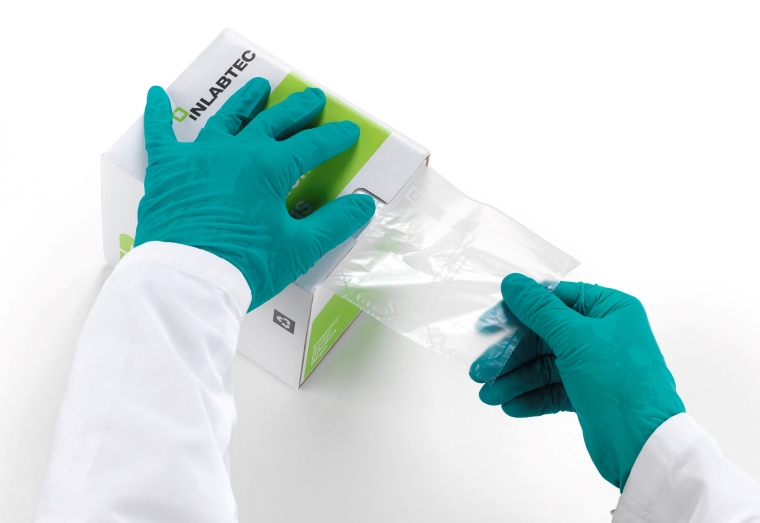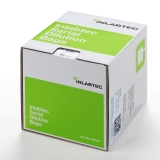
Resource-Efficient Sample Dilution with Serial Dilution Bags
Discover Inlabtec’s Serial Dilution Bags: eco-friendly, cost-effective, and designed to revolutionize microbial testing. They significantly reduce plastic waste and energy consumption. Achieve efficient, accurate, and sustainable results with less environmental impact.
Key Features
- Each bag is made from only 250 mg of high-quality polyethylene.
- Specifically designed for use with the Inlabtec Serial Diluter (patented).
- Free from any substances that could interfere with the growth of microorganisms.
- Each bag is sterile, ensuring the integrity of microbiological testing.
- Conveniently dispensed in rolls of 2,000 from a user-friendly cardboard box, simplifying access and usage.
- Cardboard box shrink-wrapped for straightforward, long-term storage at room temperature.
Advantages
- Eco-friendly: Dramatically cuts plastic waste and energy use, setting a new standard in eco-friendly testing.
- Cost-effective: Less material and energy use lead to cost savings.
- Efficiency: Ready-to-use bags simplify workflows and save time.
- Accuracy: Specifically designed for use with the Inlabtec Serial Diluter (patented), ensuring precise dilutions.
- Reliability: Free from substances that could interfere with microorganism growth and sterile to ensure the integrity of microbiological testing.
Specifications of Serial Dilution Bags
Prices and scope of delivery of Serial Dilution Bags
The listed prices are in CHF, excluding VAT, and apply only within Switzerland.
In other countries, prices are determined by our local distribution partners , reflecting local costs such as import duties, logistics, service, and support. Such price differences are standard in international markets and ensure that customers receive local support and fast delivery — services not included in the Swiss pricing for customers outside Switzerland.
| Part. No. | Description | Quantity | Price |
| 100101 | Serial Dilution Bags, for the use with Inlabtec Serial Diluters, 2'000 Bags / Box, sterile, Box sealed in a protective film  | 1+ 5+ 10+ 50+ 100+ | 152.73 140.98 129.23 117.48 105.73 |
Energy Consumption: Glass Tubes vs. Serial Dilution Bags
As laboratories increasingly focus on reducing their environmental impact while enhancing operational efficiency, the choice of materials and processes becomes critical. This table compares traditional glass tubes and Serial Dilution Bags regarding energy consumption.
| Feature | Test tube (15 g glass) | Serial Dilution Bag (250 mg polyethylene) |
| Single-Use Energy Footprint | N/A | Approx. 25 kJ per bag |
| Energy for washing | 3.6 to 5.4 kJ per tube | N/A |
| Energy for autoclaving | 5.4 to 10.8 kJ per tube | N/A |
| Total energy for washing & autoclaving | 9 to 16.2 kJ per tube | N/A |
| Energy recovery by incineration | N/A | -5 to -8 kJ per bag (offset) |
| Total energy consumption per dilution | 9 to 16.2 kJ | 17 to 20 kJ |
Polyethylene bags present a clear advantage over glass test tubes in terms of operational efficiency and sustainability when used in conjunction with waste-to-energy systems (energy recovery from incineration). While glass test tubes may appear to have a lower energy footprint initially, the recurring energy costs for washing and autoclaving make them less favorable in high-volume laboratory settings. Adopting Serial Dilution Bags can lead to resource savings, reduced environmental impact, and more streamlined workflows, making them the superior choice for many laboratories.
Comparative Overview: Glass Tubes vs. Serial Dilution Bags
In efforts to make laboratories more efficient and eco-friendly, Serial Dilution Bags stand out as a viable choice. Though glass tubes have been a long-time favorite, the emergence of clever bags presents a promising shift. Designed not just for improved efficiency, these bags also aim to tackle environmental and safety issues tied to glass tubes. This comparison aims to shed light on the Serial Dilution Bags’ benefits.
| Features | Traditional glass tubes | Serial Dilution Bags |
| Material waste | Low: if reused, but breakage risk remain concerns. | Moderate: low plastic waste due to minimal material use. |
| Energy consumption | High: due to washing and autoclaving. | Low: primarily from use and transport. |
| Efficiency | Low: requires handling, cleaning, sterilization and filling. | High: ready-to-use, no additional preparation required. |
| Reliability | Moderate: depends on proper handling and cleaning processes. | High: consistent due to standardization and single-use design. |
| Quality assurance effort | High: variability in cleaning, correct filling and sterilization introduces risks. | Low: standardization and single-use design ensures consistent quality. |
| Manual skill requirements | High: requires skilled handling, cleaning, and work organization. | Low: simple handling and work process due to automation. |
| Risk of injury | Moderate: risk of glass breakage injuries and repetitive strain from handling and mixing. | Low: no glass, reduced handling by automation. |
| Cost | Substantial: includes energy, labor, and potential costs from breakage. | Moderate: cost-effective consumables, labor savings |
| Sustainability | Moderate: reusable but energy and resource-intensive. | Moderate: energy-efficient but generates plastic waste, potential for recycling or energy recovery. |
| Environmental considerations | Impact from chemical detergents, water usage, and energy for washing/autoclaving; reusable design reduces per-use impact. | Generates plastic waste; responsible disposal and recycling important; potential for energy recovery via incineration. |
In the pursuit of greater efficiency and eco-friendliness in laboratories, Serial Dilution Bags emerge as a compelling alternative to traditional glass tubes for serial dilutions. While prefilled test tubes have long been the standard, these innovative bags represent a promising shift in laboratory practices. Designed not only to enhance efficiency but also to address environmental and safety concerns associated with glass tubes, Serial Dilution Bags offer a forward-thinking solution. This comparison highlights their key advantages and the value they bring to modern laboratories.
«Works perfectly, very satisfied. Appealing, as there is little plastic waste.»
Kathrin Hauser, AGES Austrian Agency for Health and Food Safety Ltd., Graz
«Unthinkable that test tubes are used again in our laboratory for dilutions.»
Alexandra Dostal, Cantonal Laboratory of Thurgau, Frauenfeld, Switzerland
More information about the Serial Dilution Bags in Support.